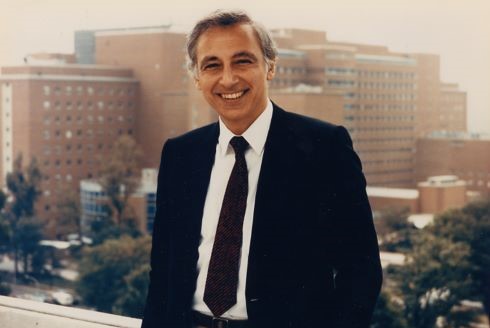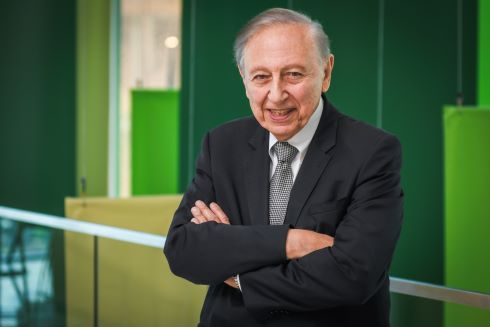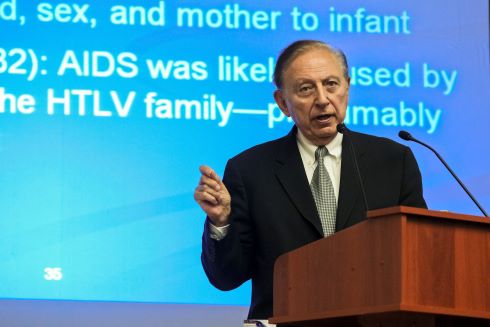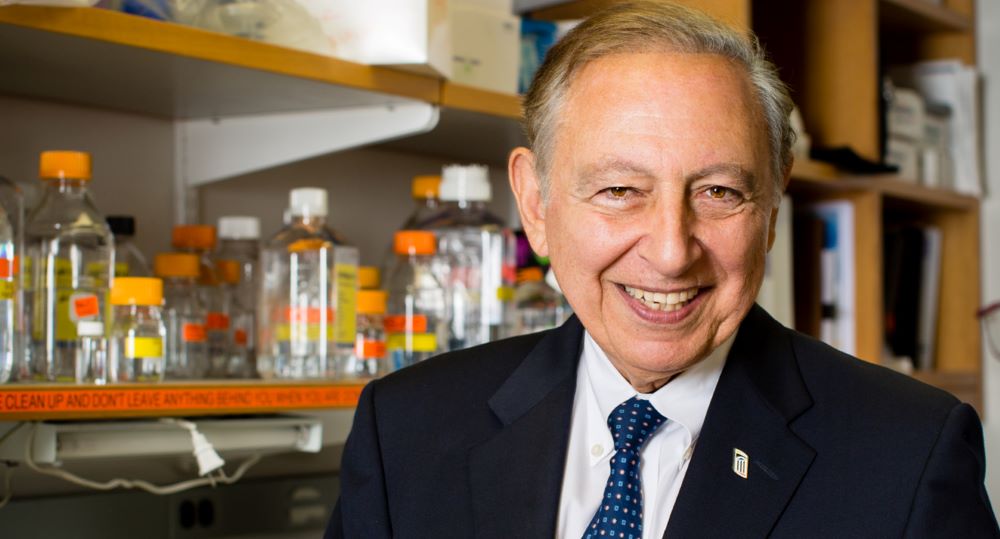There was a time decades ago – long before he became one of the world’s pioneering researchers, received the American version of the Nobel Prize not once but twice, ranked for 10 years as the most cited scientist on earth, and, oh yes, co-discovered the HIV virus – that Dr. Robert Gallo was simply a working-class kid from a Connecticut metal-mill city with a passion for basketball.
He was a standout, 6-foot forward for Waterbury’s Sacred Heart High School, with good enough shooting and ball-handling skills to make the All-Star team in an early 1950s basketball camp run by future Boston Celtics legend and NBA Hall of Famer Bob Cousy.
“I even played him man-to-man in one game – I was checking him, and he was checking me – and I remember saying, ‘Mr. Cousy, please don’t make a fool out of me,’ ” he recollected with a laugh during a recent telephone interview. A hearty 86, Gallo is speaking forthrightly from his longtime home in Bethesda, Md., about his decision to join the faculty of the USF Health Morsani College of Medicine and – in a landmark development for Tampa Bay – establish the University of South Florida as the host of the international headquarters of the Global Virus Network (GVN), the organization Dr. Gallo co-founded.
It is a long way from those early years in Waterbury. Dr. Gallo’s basketball exploits aside, life was not always easy or filled with joy in the Gallo home, where he and his younger sister lived with their parents in a modest house his Italian grandparents purchased after coming to the United States to start new lives.
In Waterbury, his father, Francis Gallo, went from working as a blacksmith with his brothers to starting a small welding business with them in a city known as the hub of the U.S. brass industry. He later took courses at home in chemistry and physics, toiling long hours to lead his company and eventually even was sent to South America by the U.S. government to teach metalurgy.
Then tragedy struck. When Gallo was 12, his 5-year-old sister, Judith, was diagnosed with leukemia. The news was devastating to Francis, his homemaker wife Louise, and their son, Robert. The parents took Judith for treatment in Boston, while Robert stayed with family friends in Waterbury. The medical expenses depleted the parents’ finances, and Gallo even remembers resenting his sister for taking his mother and father away for weeks at a stretch.
“It was a long time, because she was one of the first remissions in the history of cancer research,” Gallo said. “They thought she was cured, and didn’t know what a remission was.
“My parents had stayed with her in Boston and one day relatives planned to take me from Connecticut to visit her in the hospital – and maybe she could even come home,” he said. “But then I was told it had advanced, that she was sick again, and we were going to go to Boston so I’d have a chance to see her. It was now clear she was going to die. She actually told my parents that when she died not to worry.”
One year later, Judith was gone, and the grief thrust Gallo’s father into a progressive decline. “Every day, he made the rounds in our house – there was a photograph of her in every room – and he would hold a picture close to his chest and mumble,” Gallo recalls. “That was something very difficult to grow up with.”
But sorrow gave way to a new direction for young Gallo. It didn’t happen overnight or in a light-bulb moment of clarity. Still, the death of his little sister from leukemia would profoundly shape his future, ultimately leading him on a path into medicine. It happened in a fateful twist. A back injury during his senior year at Sacred Heart forced him to miss much of the basketball season. With extra time on his hands, Gallo began pondering his direction and contacted Dr. Marcus Cox, the pathologist who had diagnosed his sister.
“In the summer before I went to college, he brought me into autopsy rooms,” Gallo said. “One day, he threw the instruments on the table with an unclaimed body and said, ‘You do it.’ And he walked out. It was an incredible experience.”
By the time he entered Providence College in 1956, Gallo had made a decision. He wanted
to become a medical researcher to seek cures for diseases like the one that had taken
away his little sister. “That influenced me without any question,” he said.
From heartbreak and loss, the seeds of a renowned career were sown, continuing at Jefferson Medical College in Philadelphia; a medical residency at the University of Chicago; 30 years as a researcher at the National Cancer Institute in Bethesda, primarily as head of the Laboratory of Tumor Cell Biology; and since 1996 as director of an organization he co-founded – the Institute of Human Virology at the University of Maryland School of Medicine in Baltimore.
Now USF stands to reap the rewards through a partnership with a legend, perhaps not unlike the great Bob Cousy, in his own right.
• • •
Understandably, the news on June 5 that Dr. Gallo and four seasoned investigators would join the faculty of USF Health, while USF would become the host of the GVN’s international headquarters, was cause for major excitement. The partnership puts the university at the forefront in the mission to advance knowledge of viral pathogens and potential pandemics, uniting more than 80 centers of excellence and affiliates in some 40 countries.
USF Health is no stranger to the network. In 2021, it was selected as the first regional GVN headquarters, guided by Dr. Christian Brechot, MCOM’s senior associate dean of Research for Global Affairs and GVN’s vice chair. Now it will be command central, with one of the country’s most renowned researchers part of the fold.
“I am thrilled that Dr. Gallo, who is a true pioneer in medical research and a hero of American medicine, is joining USF Health,” Charles J. Lockwood, MD, MHCM, executive vice president of USF Health and dean of the Morsani College of Medicine, proclaimed in the wake of the announcement. “Together with Dr. Gallo and his virology team, USF Health will lead new research discoveries in the battle against infectious disease threats worldwide.”
Dr. Lockwood noted that, in addition to having been the most cited scientist in the
world from 1980-90, Dr. Gallo was ranked third globally for scientific impact from
1983-2002, has published more than 1,300 scientific papers “and remains actively engaged
in making research advancements in his field.”
Dr. Gallo, for one, concurs that he has no intention of slowing down anytime soon.
“I am psychologically and neurologically unable to stop,” he said. “People ask me why, and I say, ‘Watch the hamster in the cage go round and round.’ I’ll stop when the day comes somebody says, ‘Dr. Gallo, it’s time, you’re not what you used to be,’ or I’m dead. But right now I feel I can compete effectively. One advantage of your age is you know your strengths and weaknesses. And I feel very confident and capable.”
He has good reason. Here is a man who, in the 1970s, discovered the first human RNA tumor virus, known as the Human T-Cell Leukemia Virus-1 (HTLV-1), and its association with certain human leukemias and lymphomas. The breakthrough involved retroviruses, a type of virus that inserts a DNA copy into a host cell it invades, altering the genome of that cell. And it led in 1982 to his first Lasker Award, the U.S. version of the Nobel Prize, bestowed annually since 1945 to the living person considered to have made the most significant contribution to medical science or demonstrated public service on behalf of science.
Of course, Dr. Gallo remains etched in history for his early 1980s contributions in demonstrating that another retrovirus he and his team had isolated – HIV – was the cause of AIDs. The discovery came against a backdrop of fear and uncertainty as the AIDs epidemic swept through the gay community. Gallo and his team of investigators initially believed that the virus was linked to the leukemia viruses of their prior work. Instead, their milestone finding – that the retrovirus known as HIV-1 causes Acquired Immune Deficiency Syndrome (AIDS) – solved a life-and-death mystery and led to a blood test to detect potential HIV in at-risk individuals.
After a complex series of events, Dr. Gallo shared the patent for the discovery with a French team at the Pasteur Institute. His find resulted in his second Lasker Award in 1986, making him today the only living person with two.
At the Human Virology Institute, Gallo’s team went on to run an ongoing program of research and clinical care for those afflicted with HIV/AIDs, including nearly 500,000 patients treated with antiretroviral medications and some 3 million people receiving prevention interventions and HIV testing.
In recent years, however, Dr. Gallo became eager for a new challenge and greater flexibility
in his research endeavors. At an age when slowing down would have been understandable,
it was not even an option. He made plans to accept a guest professorship at the prestigious
Ragon Institute in Cambridge, Mass. The institute unites Mass General, MIT and Harvard
scientists and engineers to better understand the immune system and human health.
Meanwhile, over the past several years, discussions gained momentum with USF to bring Dr. Gallo and the Global Virus Network to Tampa. The more he learned about the area, the university and its dean, the more a move piqued his interest.
• • •
Dr. Gallo knew of USF through his close friendship with then-GVN president and USF professor Dr. Brechot. And that sparked initial conversations about a relocation.
“I’ve always stayed in contact with Christian, and he’s always been supportive of me,” Dr. Gallo explained. “He never said, ‘Why don’t you come here?’ but he would talk about it and the need to have a central headquarters. We didn’t want it in Maryland anymore. But my team and I didn’t really know that much about USF and actually nothing about Tampa. So it took some time and more talks.”
Those discussions were furthered by another longtime friend, Dr. Eduardo Sotomayor, director of the Cancer Institute at Tampa General Hospital, who got to know Dr. Gallo well while running the cancer center at George Washington University in Washington, D.C.
“So I knew Christian and I knew Eduardo, and Eduardo really worked on this, saying how much he would love to work together,” Dr. Gallo said. “He kept saying he thought this could happen and that the administration would really be interested and that I’d be happy.”
Still uncertain about Tampa, Dr. Gallo and his wife Mary Jane – his high school sweetheart to whom he has been married 64 years – flew to town for a get-to-know-you dinner party at the Columbia restaurant in Ybor City. “There were about 30 people,” he recalls, “and my wife whispered to me, ‘I think I could really be comfortable here.’ ”
But the clincher was a meeting with Dr. Lockwood. “We had a long meeting, and my bottom line is this: he is really sharp and has a terrific background that covers the waterfront,” Dr. Gallo said. “He’s very smart, inspiring, has a supportive and great personality – and is fun to be with. I can’t say enough about Charly. I’ve told people he’s the most impressive administrative leader in all my career – as good as it gets.”
That iced the deal. It was only a matter of time for the details to be worked out. Come July, Dr. Gallo and team members will begin shifting operations to USF – undertaking a host of new studies.
Consider it one more milestone moment for a man who has had a lifetime’s worth, not unlike his childhood sports heroes, Cousy and New York Yankees icon Joe DiMaggio, whom he also once met. “What struck me was they had the same kind of strong hands,” Dr. Gallo remembers.
The same could be said of his own, which helped to shape the course of modern medical research – and may still hold more major discoveries yet.
Coming next…Part II: The impending arrival of Dr. Robert Gallo, his investigative team and the Global Virus Network at the University of South Florida, showcases how collaboration powers virology research. To read part II, click here.
Photo credit: photos 1 and 4, Institute of Human Virology, University of Maryland College of Medicine; 2, National Institutes of Health; 3, Freddie Coleman, USF Health News
